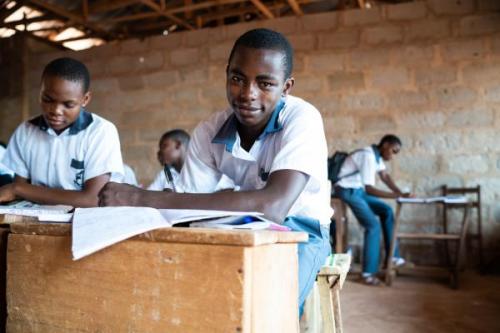The Government of Nepal was one of the earliest endorsers of the Safe to Learn Call to Action, and in 2020 several important steps unfolded to make learning environments safer in the country, even in the midst of the COVID-19 pandemic.
The End Violence Fund, using funds from the UK Government, made three innovation investments to protect children in and through schools across the country. Mercy Corps, Voluntary Services Overseas (VSO) and World Education received funding to use evidence-based interventions to deliver on three priority areas of the Call to Action:
- Policy and legislation
- Prevention and response at the school level
- Social norms and behaviour change
Although they began work at the height of COVID-19, the three organisations continued to move forward, adapting to meet the new reality of school closures and distance learning. Innovations included adapting materials for distance learning, creating a radio talk show to reach children and parents, hosting teacher trainings on Zoom or outdoors, and developing a mobile app for remote data collection.
A second area of progress in Nepal involved a multi-stakeholder process leading to a comprehensive assessment of the country’s progress toward enduring safe learning environments for all. UNICEF Nepal, with support from the World Bank and in collaboration with Cambridge Education, conducted a diagnostic exercise funded by the World Bank and the UK Government. The exercise, conducted across all seven Nepalese provinces, aimed to gauge the degree to which the Government of Nepal has met the benchmarks set out in the five Call to Action areas. It also aimed to identify best practices, gaps and priorities to enable Nepal to meet benchmarks and establish a baseline for tracking progress.
The study found that Nepal has made significant progress in all five areas of the Call to Action, noting the critical role that NGOs play in promoting safe schools and recommended enhanced coordination at the federal, provincial and local levels. It also identified good practices to end violence in and through schools in the country and shared several recommendations to accelerate progress. Nepal has national guidelines of the MOEST (Complaint Response Guidelines 2016) to guide the development of procedures in schools to receive and address complaints from students, especially those related to incidents of physical, mental and sexual violence. All secondary schools are requested to set up a complaint box and appoint a female teacher as gender focal person. Additionally, at policy level, as part of its School Sector Development Plan (SSDP), Nepal has a specific strategy to ensure schools are safe spaces to learn.
Read more about the progress of Pathfinding Countries in our 2020 Annual Report.

